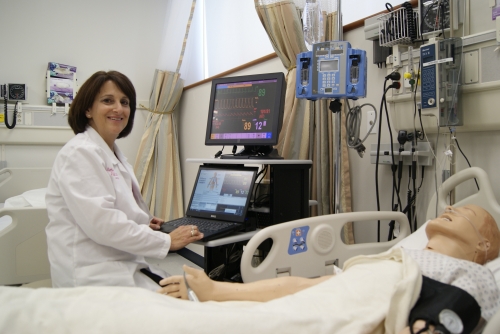Shown bedside with SimMan, one of the family of patient simulators used to teach clinical skills and judgment, Dr. Bette A. Mariani investigates topics related to simulation. Her efforts often build upon her work on instrument development and validation.
Adept in the Science of Simulation
Assistant Professor Bette A. Mariani, PhD, RN

What’s the best way for faculty to teach nursing students through innovative simulation before they enter clinical settings? To answer that broad question, Dr. Bette A. Mariani primarily uses quantitative methods. “Clinical simulation is important for the education of our students because it helps us to prepare nurses to enter a challenging profession. Providing safe, quality care for patients is essential,” she observes. Dr. Mariani has conducted multiple studies to assess this interactive teaching and learning strategy for millennial learners. She aims not only to enhance their skills, but to make a difference in their learning outcomes of clinical judgment and reasoning—critical elements in nursing practice.
Dr. Mariani explores the importance of structured debriefing on student learning; the effectiveness of simulation for the teaching of quality and safety, including for medication administration; and the use of standardized patients (SPs) with disabilities to assess the attitudes of undergraduates before and after their experience with SPs. She collaborates with colleagues and the Main Line Health System to study the use of simulation as an educational strategy for nurses’ clinical preparedness in pediatric emergencies. Additionally, she and her colleagues are extending simulation research with Spanish-speaking community health workers in Nicaragua through the testing of newly developed simulation scenarios and basic skills competency tools.

